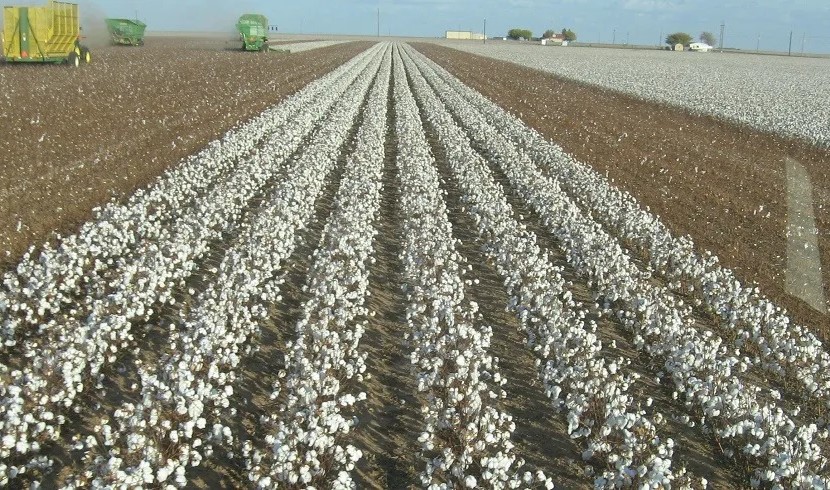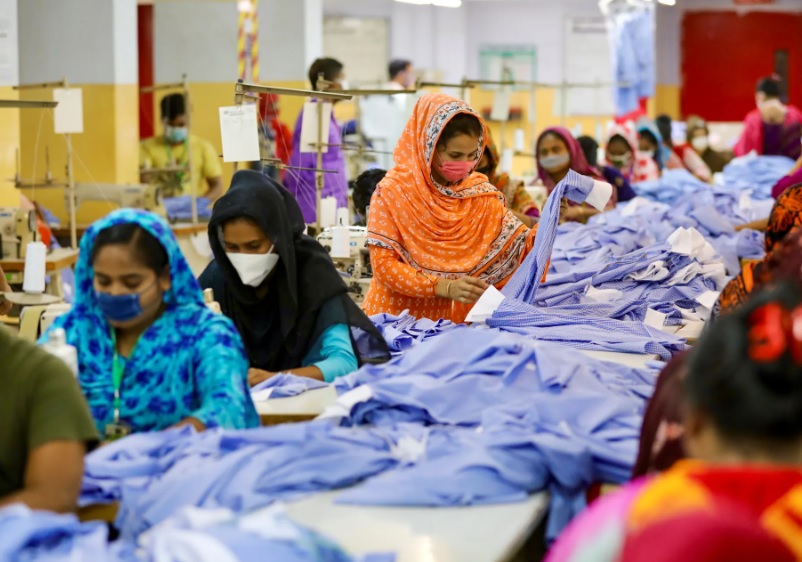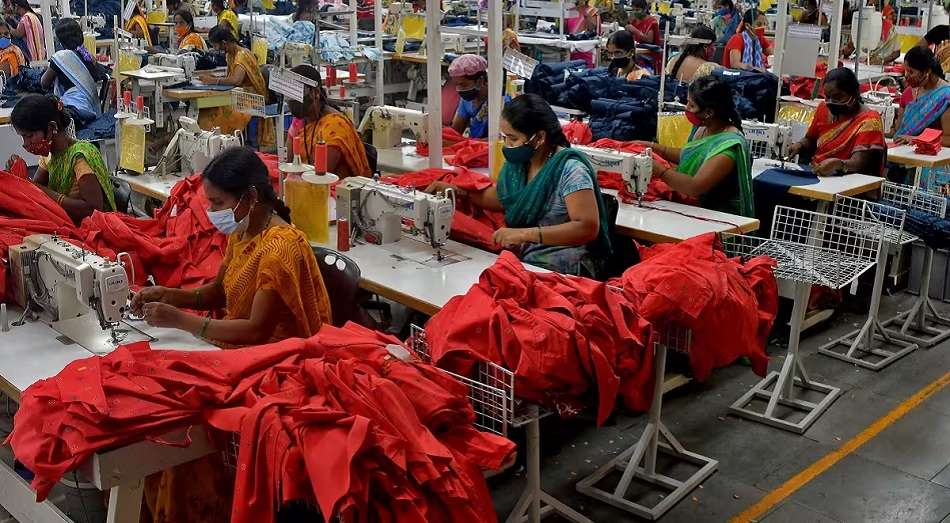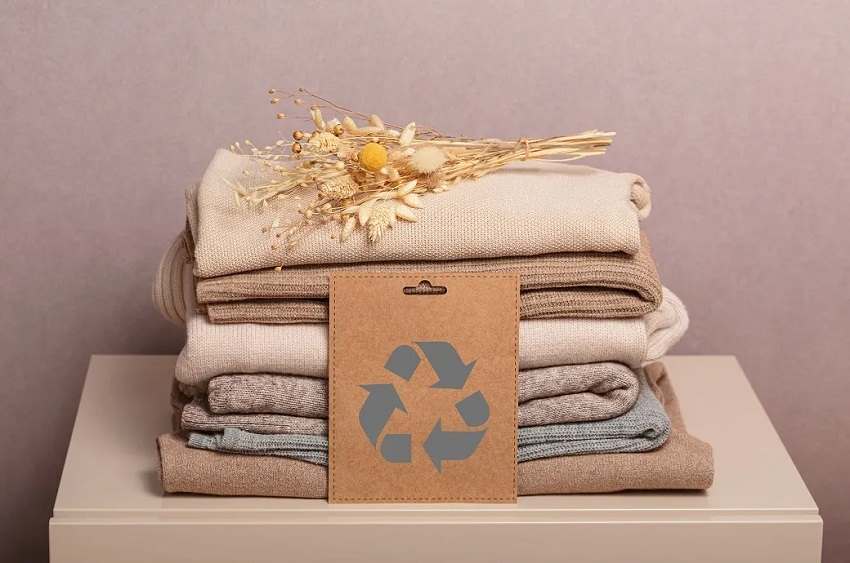FW
"Taking a cue from Rana Plaza incident that occurred four years back in Bangladesh, clothing manufacturers have been showing signs of change when it comes to partner selection across the globe. The tragedy was marked as a wake-up call for the industry and a chance to improve the safety of global supply chains. More than 200 brands and retailers from Europe and the US signed legally binding agreements – the Bangladesh Accord on Fire and Building Safety and the Alliance for Bangladesh Worker Safety."

Taking a cue from Rana Plaza incident that occurred four years back in Bangladesh, clothing manufacturers have been showing signs of change when it comes to partner selection across the globe. The tragedy was marked as a wake-up call for the industry and a chance to improve the safety of global supply chains. More than 200 brands and retailers from Europe and the US signed legally binding agreements – the Bangladesh Accord on Fire and Building Safety and the Alliance for Bangladesh Worker Safety. They agreed to improve labour rights and safety standards, and collectively pledged $100 million to enforce the standards set by the Accord and the Alliance. Yet progress remains slow.

An investigation by NYU Stern Center for Business and Human Rights published last year revealed only 27 per cent Bangladeshi factories are covered by the initiatives, effectively excluding almost three million RMG workers from their protections. Campaigners are calling for further action from retailers and brands, including strengthening the Bangladesh Accord, points out Orsola de Castro, Founder and Creative Director of Fashion Revolution, a not-for-profit organisation that campaigns for reform in fashion industry.
Transparency the bedrock of reform
According to de Castro, the health and safety situation in Bangladesh is far from resolved. Workers in developing countries around the world continue to suffer huge abuse, and are not yet being paid a living wage or an adequate wage to support their families and live a dignified life. According to an H&M official, the first step has to be transparency. It means brands holding themselves and their suppliers accountable on issues such as human rights, fair jobs and environmental protection. The official says, they customers to know they do their best to ensure the fashion they offer has been made, transported and sold responsibly.
Retailers such as H&M have been releasing lists of their suppliers to enhance transparency in the system. The Fashion Transparency Index (FTI), Fashion Revolution’s annual report into companies’ commitment to cleaning up their supply chains, also marks progress in this area. The index ranks how much information 100 of the largest global fashion businesses disclose about their social and environmental policies, practices and impacts.
The second annual report was published last month and found 31 brands are now disclosing full lists of their direct suppliers – an increase from just five in 2016. However, publishing lists of suppliers reflects just how much brands need to do to ensure fair practice throughout their supply chains. Most have hundreds of suppliers spanning several continents, and ensuring high ethical standards across all is surely difficult.
Concerns about sustainability
Indeed textile production uses enormous amounts of chemicals and factory run-off leads to water pollution. This has raised serious concerns about sustainability. Top global brands such as Stella McCartney and Nike have been voicing their concern and investing significantly in tracking and improving their environmental impact. Gap has also committed to reducing its environmental impact, by taking steps to obtain 100 per cent of its cotton from sustainable sources by 2021. Gap’s chief product officer, Wendi Goldman says it is an opportunity to make a big impact on the global cotton community, and bring to light what’s so incredibly important to the future of garment manufacturing.
The fact one can’t ignore is that today’s fashion industry has to pay the price for years of inadequate regulation, inconsistent compliance and opaque systems that hide traceability and accountability. The huge size of the industry, which is worth $2.4 trillion and employs millions of people, makes it difficult to unravel. There needs to be concerted efforts from governments, regulators, NGOs, trade bodies and factory owners, as well as consumers, brands and retailers to reap the fruits of labour.
Indonesia is encouraging its textile industry to be environment-friendly, since it’s necessary for business sustainability. The United States and Europe have strict standards and products containing hazardous chemicals are rejected.
Environment-friendly industries fall into several categories. First the industry does not pollute the environment of water, air, and soil. Second, the raw material can be recycled, re-used and is re-degradable. Third, the products used in production of finished products must be environmentally friendly. In addition, efficiency and effectiveness factor in energy use are also important factors.
The textile sector in Indonesia is expected to grow seven per cent this year. The country is looking to a relaxation of import duties in the US for goods exported from Indonesia.
In addition, rules for imports of textile and textile products have been tightened. And results are visible. Import of fabrics as a raw material for garments fell by 33 per cent in the first quarter of 2017. The aim is to discourage fabric imports to push up domestic fabric production. The textile and garment industry is one of Indonesia’s oldest industries and the country makes up about two per cent of the global textile market. Although Indonesia produces cotton, textile manufacturers prefer to import cotton because the quality of foreign cotton is much higher.
Invista has purchased Cone Denim’s and ITG’s dual core patent portfolio.
International Textile Group (ITG) is the parent company of Core Denim.
The patent estate covers a broad variety of dual core yarns, fabrics, and garments made from those fabrics, which are sold in the US, China, and most recently, Europe. The purchase is effective immediately.
Invista was a pioneer in the development of dual core technology with its Lycra Dual FX fabric concept, first introduced commercially in 2010. The Dual FX technology encompasses stretch fabrics made with two stretch fibers – Lycra and Lycra T400 fibers – in a single yarn.
Cone will collaborate with Invista to provide a global platform to take this technology to the next level and will continue to produce yarns and fabrics made with Sgene technology under a license from Invista.
Invista, based in the US, is one of the world’s largest integrated producers of chemical intermediates, polymers and fibers. Its leading brands are Lycra, Coolmax, Cordura, Stainmaster and Antron.
The company’s advantaged technologies for nylon, spandex and polyester are used to produce clothing, carpet, car parts and countless other everyday products.
Cone Denim delivers expertise and denim capabilities that service and inspire the global market. It offers unique collections of Selvage, Performance, Stretch and Natural Indigo denims.
Levi’s has unveiled a collaborative capsule of the classic trucker jackets with men’s brand Ovadia & Sons. The assortment only consist of three styles and one of them has already been spotted on well-known music producer Jay-Z during his ongoing 4:44 tour. The jacket that Jay-Z wore was custom made by repaired vintage Levi’s denim for the artist as a teaser and had embroidered words saying Carter on the chest and Blue, Rumi, and Sir on the interior.
The styles look vintage with all of them being denim-on-denim patchwork with two of the looks sporting red and monochrome plaid patches. The Sherpa fabric lined products are slated for an official public release on January 25, 2018, at Levi’s own store in SoHo as well as on Ovadia & Sons’ website. Apart from this, the limited edition jackets that cost $595 a piece will also be available at multi-brand store Fred Segal in West Hollywood, California.
The Brooklyn-based brothers Messrs Ariel and Shimon Ovadia, who founded the brand in 2011, picked out this specific silhouette from an archive of about 50,000 vintage Levi’s pieces.
Woolmark has partnered with Australian shopping centre Westfield to put the spotlight on wool this winter’s retail season. Australian wool is the star in a curated selection of winter accessories, boots, denim and apparel. The campaign supports local retailers, starring wool in a curated selection of winter accessories, boots, denim and apparel, and celebrates Australian merino wool, the growers who produce the fiber and the designers who use it.
Westfield and Woolmark are telling the farm to fashion wool story, recognising people who produce one of the most important fibers for fashion worldwide. The campaign gives customers inspiration on how to integrate wool into their new season wardrobe, alongside a wide range of winter footwear, accessories and apparel from a number of Australia’s favorite brands, all available at Westfield.
The initiative champions the eco-credentials of fiber and says it is the perfect choice for today’s conscious consumer and that, natural or biodegradable, wool provides the global apparel industry with the most renewable, recyclable and reusable fiber on the planet.
The event is not only an engaging way for consumers to experience the natural attributes and luxuriousness of Australian merino wool, it also offers Australian woolgrowers a window into the commercial aspect of the fiber they work hard to produce.
The EU has granted Sri Lanka the GSP facility. This will allow Lanka to export its products tax-free to the European market. The country became eligible for GSP Plus after it ratified and implemented measures relating to human and labor rights, environment protection and good governance. The EU had withdrawn this facility in 2010 due to the poor human rights record of the country. Sri Lanka then applied for GSP Plus in July 2016.
The EU is Sri Lanka's biggest export market accounting for nearly one-third of Sri Lanka's global exports. In 2015, total bilateral trade amounted to euro 4.7 billion. EU imports from Sri Lanka amounted to euro 2.6 billion and consisted mainly of textiles as well as rubber products and machinery. Lanka will also get additional trade preferences.
The EU aims to support Sri Lanka’s economic growth by launching a series of initiatives which includes support to design and implement a coherent trade strategy for export competitiveness. While the UK is currently an important market for Sri Lanka, with Brexit becoming a reality, Sri Lanka will immensely benefit if it also focuses attention on accessing non-traditional markets among the EU countries. This will not only cushion the potential negative impact of Brexit on Sri Lanka but will also help contribute towards the country’s target of doubling its export revenues.
Circular Fibers is an industry-wide initiative to build a new global textile system based on the principles of the circular economy. The initiative has been launched by Ellen MacArthur Foundation. Circular Fibers brings together key industry stakeholders, such as H&M and Nike, to collectively define a vision for a new system that benefits businesses and citizens, and also phases out negative impacts such as waste and pollution.
The project will encourage businesses to shift away from the current take, make and dispose model, which puts high demand on land, energy and other resources. It aims at catalysing change across the industry by creating an ambitious, fact-based vision for a new global textile system, underpinned by circular economy principles, that has economic, environmental, and social benefits, and can operate successfully in the long term.
Textiles play an important role in the global economy. But a growing trend in consumerism has led to an inefficient waste and resource management system. In the US, for example, an estimated 85 per cent of clothing waste ends up in landfills.
Circular Fibers will provide an analysis of the textile industry. It will look at what a new circular economy for textiles could look like, and lay out the steps needed to build it.
Natural fiber producer Crailar has entered into a partnership with Canopy, an NGO working to protect ancient and endangered forests by transforming the impacts of the paper and fabric supply chains. Crailar uses an environmentally friendly process to make flax and other bast fiber residue into high-quality products while dramatically reducing chemical and water use. It is one of a growing number of solutions technology enterprises in the textile and nonwovens supply chain and a leading innovator in its commitment to only source agricultural residues.
In using agricultural residue fibers to make the next generation of fabrics, Crailar offers eagerly anticipated options for brands and retailers seeking sustainable alternatives to fabrics currently made from ancient and endangered forests.
Believing that the fastest way to protect the world’s last endangered forests is to ease market demand for their treasures, Canopy is working with 100 brand and retail partners to kick-start next generation solutions such as viscose and rayon made from straw.
Four years ago it launched an initiative, which now has over 100 international clothing brands and fashion designers, committed to end the use of ancient and endangered forests. A key component is to kickstart commercial production of fabrics and textiles made from lower-impact fibers such as straw and recycled fabrics.
Textile major Arvind has recorded a 41 per cent decline in net profit for the year ended March from a year ago. Revenue for the same period grew 9.7 per cent. With demonetisation, and a sharp increase in cotton prices and appreciation of the rupee, Arvind feels it has had a satisfactory performance. It expects to continue to have double digit growth in the coming financial year led by robust growth in its brand and retail business.
The Ahmedabad-based company has a portfolio of own and licensed brands. Its own brands include: Flying Machine, among others, while its licensed product brands include Tommy Hilfiger, Calvin Klein, Arrow, Gant, Nautica, Gap, and Aeropostale.
Arvind’s textile business (denim and fabric) contributes 60 per cent to total revenue and the rest is by brands and retail business. Arvind is one of India’s largest integrated textile and apparel companies. The company is also one of the largest producers of denim fabrics and is supplier to a large number of fashion brands in the world.
Arvind has launched its ready-to-wear brand. The brand, also called Arvind, will initially be available in Gujarat and Karnataka at 50 Arvind stores. It will then go on to all such 170 stores across 100 cities and the company’s 10,000 points of sale. The ready-to-wear brand will have clothes under the categories of work, leisure and ceremonial.
The African Development Bank (AfDB) will have its annual meeting in Ahmedabad, May 22 to 26, 2017. Experts and practitioners will discuss methods of promoting textile manufacturing in Africa, where many of the textile and clothing firms are small and medium enterprises. It will also discuss how the involvement of African countries in the global textile industry could look like, from conception and design. Models will show how African fabrics are inspiring designers.
AfDB is supporting the development of creative industries that utilize products, especially cotton, in Africa. Through this initiative, AfDB is promoting investments in the fashion sector, increasing access to finance for entrepreneurs and incubating and accelerating starts-ups.
The bank is investing in high-growth sectors that have the potential to promote economic empowerment and create 25 million jobs over the next decade. It considers creative industries as offering massive potential for continent-wide job and gross domestic product growth. For instance, instead of exporting raw cotton, Africa needs to move to the top of the global value chain and produce garments targeted at the growing African and global consumer class.
The textile and clothing market is already worth more than $31 billion in sub-Saharan Africa and accounts for the second largest number of jobs in developing countries after agriculture.











